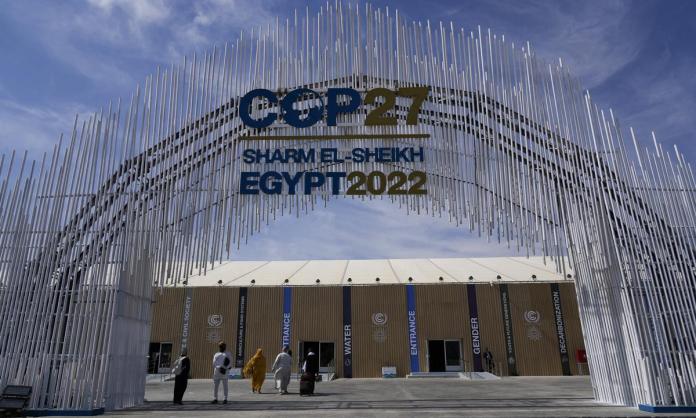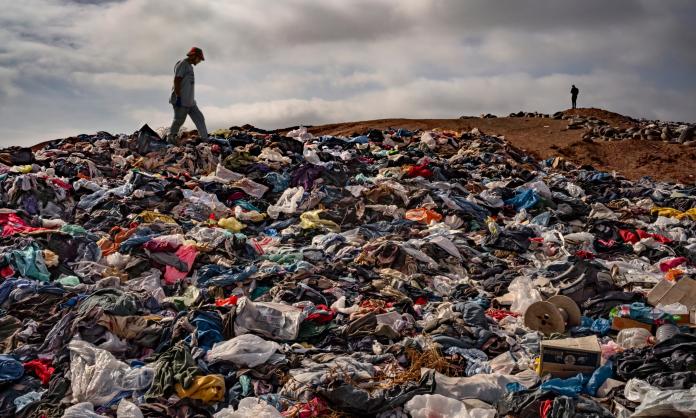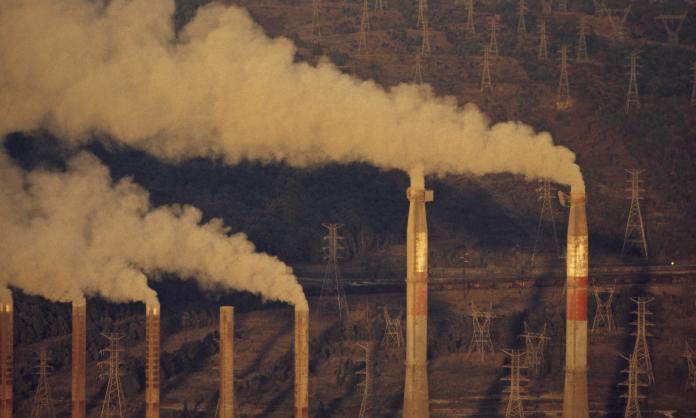The UN COP27 climate conference is taking place in Egypt, which is an apt choice for a climate conference—a military dictatorship propped up by oil money from Saudi Arabia. And it’s reflected in the outcome.
Last year’s conference, COP26 in Glasgow, was preceded by much fanfare. The world was assured that it was not merely going to be, in the words of climate activist Greta Thunberg, merely more “blah, blah, blah”. But as the UN’s latest climate report illustrates, the world’s governments are not even on track to reach their COP21 Paris commitments from 2015, let alone new commitments made in Glasgow.
The UN’s Emissions Gap Report 2022 calculates that, even taking into account policy announcements arising from COP26, the planet is still headed for 2.8℃ of warming by the end of the century. And many of the climate policies are not worth the paper they are written on. The Land Gap Report produced by the University of Melbourne recently calculated that the land needed for the scale of tree planting and forest regeneration committed to by governments since 2015 would be about 1.2 billion hectares—far more than is available for such programs. This year’s conference slogan, “together for implementation”, perhaps reflects some awareness by conference organisers of this yawning gap between commitments and reality.
At COP27, the promises have so far been much more limited. With the continuing energy crisis in Europe, and growing imperial tensions between the world’s two biggest polluters, the US and China, the trend is towards backsliding on previous commitments and boosting the oil and gas industries. The number of lobbyists from the oil and gas industries at this year’s conference “is greater than [that of] frontline communities”, according to the group Kick Big Polluters Out, and is up 25 percent compared to COP26.
Just one day before COP27 began, the Biden administration was boasting about its expansion of fossil fuel production. “Under President Biden, oil and natural gas production has increased, and we are on track to hit the highest production in our country’s history next year”, the statement read. And according to the Guardian, British Prime Minister Rishi Sunak is expected to sign a major gas deal with the US on his return from the conference.
With the change in government in Australia, one of the world’s biggest coal and gas exporter is trying to put on a coat of green paint. But the Albanese government’s commitment to 43 percent reduction puts it well below the 75 percent reduction that the Climate Council estimates is needed to limit warming to 2℃.
The rise of imperialist tensions in the Pacific is leaving the Australian ruling class feeling vulnerable. Wanting to strengthen its hold over Pacific Island nations—also some of the first victims of the climate disaster—the government is giving more lip-service to climate concerns. Prime Minister Anthony Albanese is hoping to host the COP31 event in Australia “with the pacific”. The primary concern for Australia is not the environment, but that Pacific Island nations may look elsewhere for aid and military support.
The logic of the position was laid out by the minister for international relations and the Pacific, Pat Conroy, to the ABC: “It’s very important we act on the priorities and listen to the priorities of the Pacific, if we don’t that will create a void that other countries, with less friendly intentions to Australia, will fill”.
The question of loss and damage caused by climate change, and who pays for it, has also been an important one at COP27. The very fact that it was on the agenda at all has been a talking point, given that for years, big polluters like Australia have lobbied to keep it off the table. But the devastating floods in Pakistan, and the scale and cost of the clean-up, has made the issue difficult to ignore.
There is little prospect of concrete funding agreements being reached. First, the agenda excludes questions of liability and compensation. Countries like Germany are instead hoping for an “insurance-style” scheme, in which parties contribute to a pool of funds that can be used to provide payouts for damages. Some other countries favour a humanitarian aid model. In both these models, the idea that high emitters should be particularly liable is downplayed.
Second, current climate financing commitments made for mitigation and adaptation at previous conferences have fallen far behind schedule. According to Nature, despite commitments of US$100 billion annually made at COP15 in 2009, more than 80 percent of financing comes in the form of loans for projects that financiers expect to make a return from.
The Australian government is reluctant to make any commitment on this score, instead pointing to its own climate financing and development aid to the pacific as an alternative. Conroy, speaking to ABC, was emphatic on the point that talks at COP27 were premised on liability not being discussed.
Some in the media have dubbed this the “African COP” because it is taking place in Africa, is discussing loss and damage and because it will supposedly address some of the concerns of African countries. But the reality is that European and other world powers are looking longingly towards Africa’s vast reserves of oil and gas as a solution to their energy woes. And many of Africa’s ruling classes are willing to oblige. The African Union was seeking to present a unified position at COP27 which emphasised expansion of African gas industries. The Egyptian government, just one week before the conference, was lauding its growing gas industry and its plans to double exports.
Capitalism is incapable of providing solutions to the climate crisis. As long as governments’ primary motivations are driven by the needs of capitalist competition, they will keep stalling on real action. These global climate conferences provide no way forward for the environment movement. As Greta Thunberg said at her recent book launch, “COPs are not going to lead to any major changes. Unless of course, we use them as an opportunity to mobilise, which we must try to do, and make people realise what a scam this is, and realise that these systems are failing us”.










